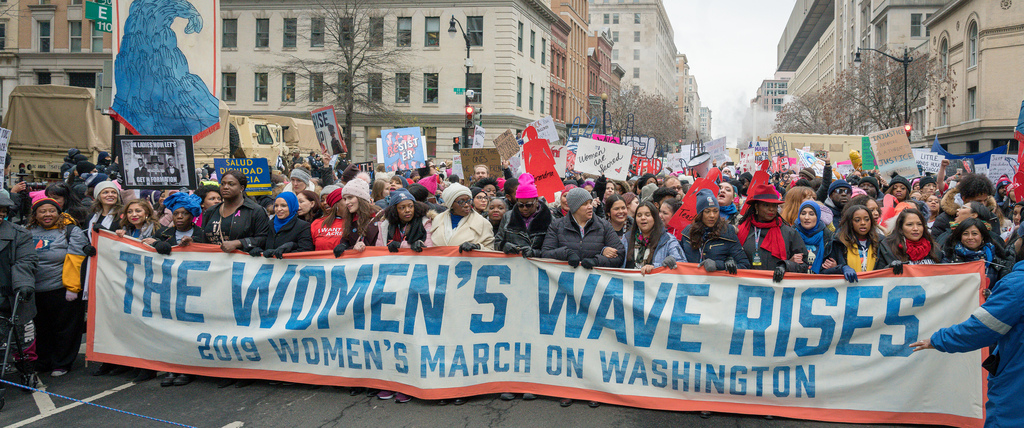The 2019 Women’s March rallied hundreds of thousands of marchers in D.C.’s Freedom Plaza on Jan. 19. Amid controversy and cold temperatures, an estimated 725,000 marchers showed up, a smaller turnout than the first march in 2017.
In their recently released “Women’s Agenda,” the Women’s March team provided 24 federal policy priorities that would serve as the foundation of the 2019 platform and a future work plan for Congress. Alongside advocacy of intersectional feminist policies, the “Women’s Agenda” brings attention to three policy priorities, including universal health care, an Equal Rights Amendment to the Constitution, and ending war.
While the Women’s March has, in previous years, battled charges of a lack of diversity in its leadership, the 2019 Women’s March has been surrounded by further accusations of anti-Semitism.
In November 2018, co-founder of the Women’s March Teresa Shook accused the current co-chairs of anti-Semitism, anti-LGBTQ sentiment, and racism. Shook stated in her Facebook post, “Bob Bland, Tamika Mallory, Linda Sarsour and Carmen Perez of Women’s March, Inc. have steered the Movement away from its true course … I call for the current Co-Chairs to step down and to let others lead who can restore faith in the Movement and its original intent.”
Tamika Malloy’s support of Louis Farrakhan, leader of the Nation of Islam, has caused heightened controversy as many accuse the Women’s March leadership of anti-Semitism due to Farrakhan’s anti-Semitic rhetoric.
While many Georgetown students did choose to attend the march, a number of Georgetown students did not go in protest.
Zev Burton (SFS ’22), a member of the Jewish community at Georgetown, chose not to go to protest the leadership of the march. “In being Jewish, I have a lot more of a personal connection, but I also believe that if these organizers came out very much against the LGBTQ community, if they came out against the African American community, that most people would not go. And I see anti-Semitism as the same thing,” Burton said.
What stood out to many students was the lack of an apology given to the Jewish community in addition to the refusal to condemn Farrakahn. Yebin Won (SFS ’22) also chose not to go, commenting on the leaders not taking responsibility for their actions. “They did not try to rectify it, they didn’t really deny it,” Won said. “And that was really crushing to me because I felt that this was a place where all women should be accepted.”
Rachel Freidman (COL ’22), a member of Georgetown’s Jewish community, said that her synagogue, Stephen Wise Free Synagogue in New York, issued a statement that they would not support that particular Women’s March organization, but would march with a similar coalition. In D.C., the March for All Women, organized by the Independent Women’s Forum, met at Pershing Park as a counter-rally for women who do not feel included by the Women’s March. Friedman said, “I went to the first Women’s March. I felt so empowered that day, and to find later that you aren’t included in that is really disappointing.”
However, many Georgetown students also chose to attend the March. Gathered at Freedom Plaza, women from diverse backgrounds spoke on a stage with interspersed musical performances.
While aware of the controversy, Siena Hohne (COL ’22) said she chose to attend the march with a group of Georgetown students. “I think the message that we send to political leadership is more important than what one person in the leadership of the March shows,” Hohne said. “I don’t think that just one person’s terrible opinions should prevent us from showing Trump that we are mad.”





